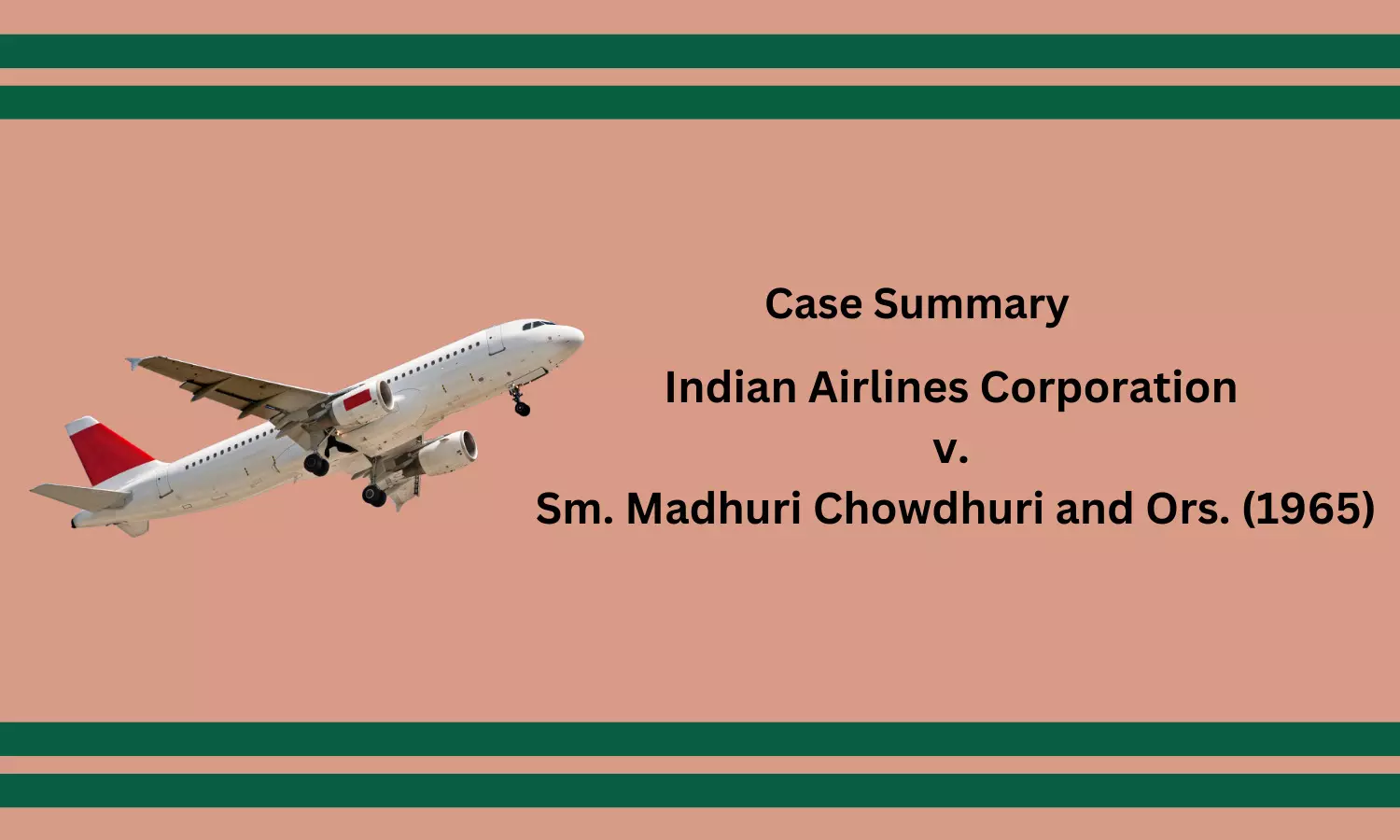Case Summary: Indian Airlines Corporation v. Sm. Madhuri Chowdhuri and Ors. (1965) | Validity of an Exemption Clause
This case highlights the legal principles governing liability in air carriage contracts, particularly the enforceability of exemption clauses.

The judgment affirms the freedom of contract, allowing carriers to limit or exclude liability through explicit terms, provided such clauses are not prohibited by statute.
Case Title: Indian Airlines Corporation v. Sm. Madhuri Chowdhuri and Ors.
Court: Calcutta High Court
Citation: AIR 1965 CAL 252
Judges: P.B. Mukharji, J.
Facts of the Case
The Accident: The Dakota VT-CHF aircraft was en route from Nagpur to Madras when it encountered engine trouble shortly after takeoff. The plane attempted to return to the runway but crashed, resulting in the deaths of all passengers and crew except the pilot, Captain Desmond Arthur James Cartner. The widow of Sunil Baran Chowdhury, along with their two minor children, filed the suit seeking Rs. 1,55,000 in damages, alleging negligence by the airline and breach of contractual and statutory duties. Indian Airlines Corporation relied on an exemption clause in the air ticket, which absolved it of liability for passenger injury or death, including cases of negligence by its staff.
Trial Court Decision: Justice P.C. Mallick decreed in favour of the plaintiffs, awarding Rs. 1,55,000, holding the exemption clause invalid and the airline liable for negligence.
Issues
Validity of the Exemption Clause: Whether the exemption clause in the ticket absolved Indian Airlines Corporation of liability for the passenger's death.
Negligence by the Airline: Whether negligence on the part of the airline or its staff caused the crash.
Applicability of the Carriage by Air Act, 1934: Whether the Act or any statutory provision applied to the internal carriage of passengers by air within India.
Plaintiffs’ Allegations
The plaintiffs contended:
- The crash occurred due to the defendant’s negligence and/or misconduct, citing:
- Defective engine checks.
- Failure to follow proper emergency landing procedures.
- Inadequate training of pilots.
- The exemption clause in the ticket was invalid under Section 23 of the Indian Contract Act as it violated public policy.
- The Carriage by Air Act, 1934, should apply, holding the airline to a higher standard of care.
Defendant’s Defense
Indian Airlines Corporation argued:
- The exemption clause in the ticket shielded it from liability, even for negligence.
- The pilot, Captain Cartner, exercised reasonable judgment during the emergency and was not negligent.
- The crash resulted from an unforeseen engine failure, not negligence.
- Following the crash, the Government of India investigated Rule 75 of the Indian Aircraft Rules, 1937. The inquiry found no conclusive evidence of negligence by the airline but highlighted procedural lapses.
- The defendant produced multiple witnesses, including engineers, traffic officers, and the pilot, to establish adherence to safety protocols and absolve the airline of liability.
Trial Court Findings
The trial court held:
Exemption Clause: The clause was invalid as it contravened Section 23 of the Indian Contract Act, being against public policy.
Negligence: The court found evidence of negligence by the airline, particularly in its failure to ensure rigorous engine maintenance and training.
Damages: The court awarded Rs. 1,50,000 as compensation for the deceased’s loss of life and Rs. 5,000 for the loss of his personal belongings.
High Court Decision
The Calcutta High Court reversed the trial court’s findings on the exemption clause and negligence.
Exemption Clause
The High Court upheld the validity of the exemption clause, citing precedents from Indian and English common law.
It emphasized that under English common law, carriers could contractually exclude liability, even for negligence, provided the terms were clearly communicated to the passenger.
The court dismissed the trial court’s reliance on Section 23 of the Indian Contract Act, holding that the liability of common carriers was not governed by the Act but by principles of common law.
Negligence
The court found no conclusive evidence of negligence by the airline or the pilot.
It observed that the pilot made a judgment call during the emergency, which, even if erroneous, did not amount to negligence.
Applicability of the Carriage by Air Act
The High Court clarified that the Carriage by Air Act, 1934, did not apply to domestic air travel within India.
The court rejected the trial court’s interpretation that the principles of the Warsaw Convention should be applied as a matter of justice, equity, and good conscience.
Analysis of Precedents
Privy Council in Irrawaddy Flotilla Co. v. Bhagwan Das (1891): The High Court relied on this precedent to hold that common carriers in India are governed by common law, not the Indian Contract Act.
Division Bench in Indian Airlines Corporation v. Keshavlal F. Gandhi: This case upheld the validity of exemption clauses in air tickets, emphasizing freedom of contract.
English Cases: The court referred to several English decisions, including Ludditt v. Ginger Coote Airways Ltd. (1947) and Hood vs. Anchor Line (1918), to establish that carriers could exclude liability for negligence under contract law.
Key Observations
- Freedom of Contract: The court underscored the principle that parties are bound by the terms of their contract, provided they are not unlawful.
- Public Policy: The court rejected the argument that the exemption clause violated public policy, distinguishing between statutory and contractual obligations.
- Doctrine of Res Ipsa Loquitur: While the trial court invoked this doctrine to infer negligence, the High Court found it inapplicable due to the lack of evidence linking the crash to negligence.
Conclusion
The High Court allowed the appeal, setting aside the trial court’s judgment. It held that the exemption clause was valid and enforceable, absolving the airline of liability for the passenger’s death. There was insufficient evidence of negligence to hold the airline liable. The plaintiffs’ claim for damages was dismissed.
This case established a significant precedent on the enforceability of exemption clauses in contracts of carriage by air within India and clarified the applicability of common law principles to domestic air travel. It reaffirmed the legal validity of contracts limiting liability and highlighted the necessity of statutory intervention to alter such provisions.

